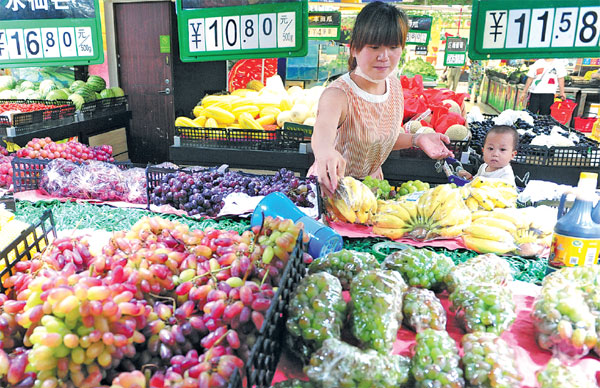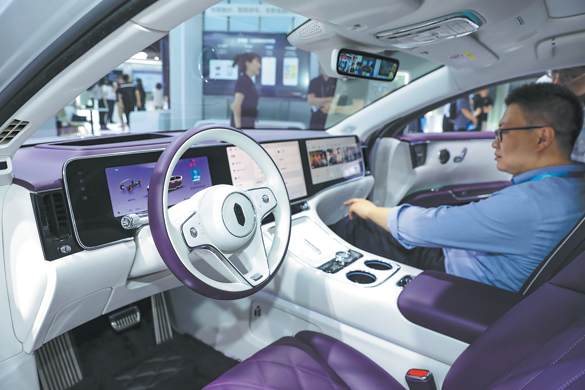Mild inflation offers room for risk control

Consumer Price Index picking up, but the trend is unlikely to continue, according to analysts
BEIJING - China's inflation accelerated faster than expected in August but remained mild overall, leaving policymakers room for containing financial leverage and risks.
Fresh data showed on Sept 9 that the Consumer Price Index, or CPI, a main gauge of inflation, rose to a seven-month high of 1.8 percent in August, compared with July's 1.4 percent, beating market expectations of 1.6 percent.
For the first eight months of the year, the CPI climbed 1.5 percent from one year earlier, according to data from the National Bureau of Statistics.
| A customer selects fruits at a supermarket in Fuyang, Anhui province. Fresh data showed that the Consumer Price Index, or CPI, a main gauge of inflation, rose to a seven-month high of 1.8 percent in August. Wang Biao / For China Daily |
Core consumer inflation, which excludes volatile food and energy prices, increased 2.2 percent year-on-year in August, up slightly from July's 2.1 percent. The core CPI has been holding steady at a little above 2 percent since March.
The stronger, yet still moderate, consumer inflation remained below the government's annual target of around 3 percent set for 2017.
The Producer Price Index or PPI, which measures costs of goods at the factory gate, climbed to a four-month high of 6.3 percent in August, compared with 5.5 percent in July, according to the NBS.
PPI growth, which was higher than the market forecast of 5.7 percent, was boosted by increases in the prices of steel, non-ferrous metals, oil and natural gas.
Analysts say the pickup in inflation is unlikely to continue because of a high comparative base in September 2016 and the fading effects of seasonal factors during the rest of the year.
Jiang Chao, chief economist at Haitong Securities, says the CPI increase will ease to 1.6 percent in September and remain subdued for the whole year.
Prices of coal, steel and other metals continued to rise in September amid the government's efforts to reduce industrial overcapacity and enhance environmental regulations, but Jiang expects September's PPI growth to fall to 5.8 percent due to a calculation factor in higher prices for the same month last year.
Guosen Securities analyst Dong Dezhi says the growth of the CPI and the PPI in August will be at their peak this year.
August's price data added to a slew of upside surprises in the world's second-largest economy, which has defied market expectations of a slowdown.
Producer prices accelerated upward, a significant positive sign for China's economy, which will help drive profits higher and enable companies to process their debt burdens a little more easily, says Tom Orlik, Bloomberg's chief Asia economist.
With downward pressure and increasing global market uncertainty complicating the outlook, analysts say the mild inflation and steady growth momentum will give policymakers more scope to continue deleveraging.
The government's ongoing drive to contain financial risks will see credit growth slowing further in the coming months, including credit flows to local governments, which may soften fixed-asset investment and weigh on economic activity, says UBS economist Wang Tao.
Xinhua
(China Daily European Weekly 09/22/2017 page27)
Today's Top News
- China to apply lower import tariff rates to unleash market potential
- China proves to be active and reliable mediator
- Three-party talks help to restore peace
- Huangyan coral reefs healthy, says report
- PLA conducts major drill near Taiwan
- Washington should realize its interference in Taiwan question is a recipe it won't want to eat: China Daily editorial































